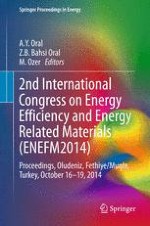2015 | OriginalPaper | Chapter
Entering the Bio Based Economy—Verification of Demand on Education in the Field of Green Economy
Author : Zuzana Palkova
Published in: 2nd International Congress on Energy Efficiency and Energy Related Materials (ENEFM2014)
Publisher: Springer International Publishing
Activate our intelligent search to find suitable subject content or patents.
Select sections of text to find matching patents with Artificial Intelligence. powered by
Select sections of text to find additional relevant content using AI-assisted search. powered by
Abstract
-
renewable energy, like wind and solar energy,
-
bio-fuel, like bio-diesel and bio-gas,
-
production of raw materials for further processing, like fibres and dyes,
-
additives, alternatives for plastics, etc.
